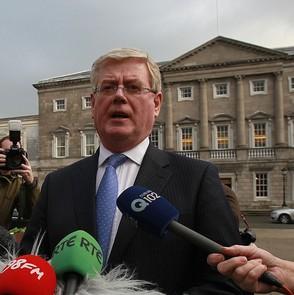We need less consensus, not more

In a conversation on television last week a journalist from a daily newspaper emphasised the importance of getting this budget passed. By Stephen Kelly
It did not matter what "rogue leftists" were saying, the main parties in the Dáil had to get behind this budget because the eyes of the world were on us and there was no realistic alternative plan. I could continue, but I'm sure we are all familiar with the meme by now.
The irony, of course, is that our concerned commentator need not have a worry in the world. What she calls for is in fact just what we have. The two parties that will almost certainly make up the next government agree with the current crowd on the fundamentals. Namely that Irish citizens should be made to pay for the misdeeds of private banks in Ireland, France, Germany, and elsewhere. They agree with this, it is important to note, in full knowledge of the social damage it will cause.
In order to create the appearance of opposition both Labour and Fine Gael have said they will renegotiate aspects of the deal 'agreed' between the government and the EU/IMF and in their pre-budget submissions have outlined what may appear to be important differences with the government. But scratch the surface and the reality is quickly laid bare. Labour, for instance, believe the 'adjustment' (ie the process by which the people pay up while bondholders escape scot-free) should be spread over a longer period of time.
So, they may fiddle with the government's formula, but they will not do anything substantially different. There is no alternative, you understand. Or, as Brian Lenihan informed us after the launch of the four-year plan, any alternative is "nonsense."
The scramble to appear outraged has resulted in some scenes that would be humorous if they were not so utterly cynical and self-serving. In an effort to convince us that he was mad as hell and not going to take it anymore Eamon Gilmore went on a loud rant in the Dáil about the loss of Ireland's sovereignty while holding the government's four-year plan aloft in his shaking hand. His time in the UCG Drama Society paying yet more dividends.
The truth is that Fine Gael and Labour desperately want this budget to pass but have calculated that they cannot be seen to vote for it. 'Let the current lot launch the attack and when we're in power we'll pretend we can't pull out' seems to be the thinking. If it were not already, this became clear in a frank interview with the Labour leader on the Late Late Show of 12 November last.
"If you are in power in the next year or so, will you reverse those cuts?" asked Ryan Tubridy. Gilmore answered in the negative, saying he wished to move away from what he called "the politics of promises." It seemed like a strange argument. Surely there is nothing wrong with promises once they are honoured.
I later asked a Labour councillor about the interview and he repeated the "politics of promises" line. The only promise, it appears, is that a vote for the 'alternative government' is a vote for more of the same.
Seeming to believe the government's own propaganda John Gormley, in his well-publicised meltdown, told the Labour leader, "You will be faced with that lack of choice, Deputy Gilmore, and it will eat you up inside."
The truth is John Gormley has had plenty of choices. He could have put his foot down on the bank guarantee, on NAMA, and on a whole host of other issues about which he would have been screaming blue murder were he in opposition. In short, John Gormley could have decided not to prop up a government that have inflicted social damage on a scale that would make Margaret Thatcher blush. Anybody who says there's no alternative is not telling the truth.
It is to be hoped that the next Dáil will have a strong opposition. However, the chances of having an alternative government worthy of that description seem minimal.
